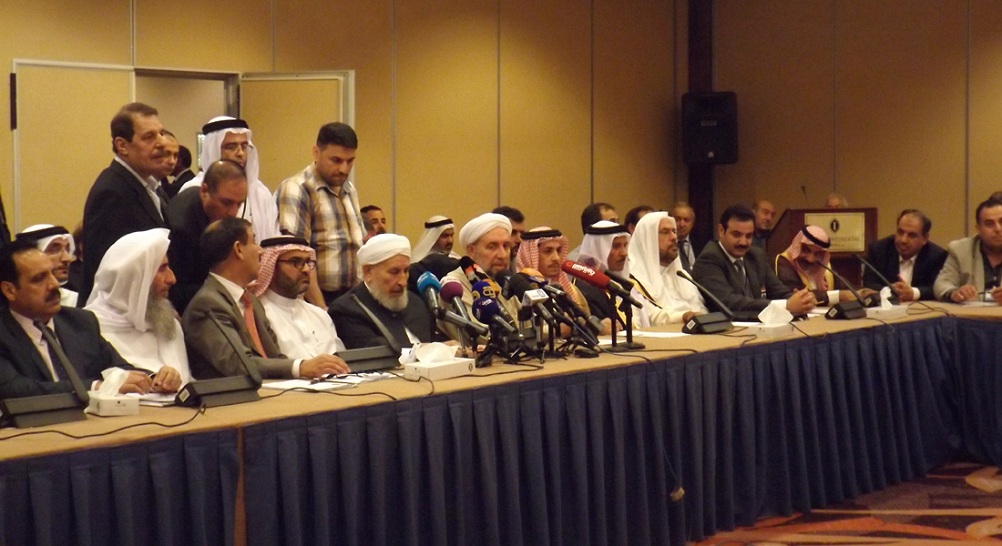Alwaght- According to the local Iraqi media reports, the Sunni groups are making preparations to hold a conference in the capital city of Baghdad that expectedly will be attended by Sunni leaders such as Tariq al-Hashimi and Rafi al-Issawi.
The efforts for holding the meeting, which is part of a series of meetings titled “decisions for Iraq's future”, are going on while the country is facing decisive developments, including the underway Mosul liberation operation, with large-scale impacts on the nation’s future and even the West Asia region as a whole.
Moreover, Sunni groups moves come while Iraq has ahead the significant provincial councils and parliamentary elections to be held respectively in 2017 and 2018. The parliamentary election is crucial as it will decide that if the current prime minister and his cabinet would remain in the office or not.
The analysts suggest that the main aim behind the conference is to pave the way for an inclusive alliance that will work to unite the Sunni political forces for post-ISIS period. Another major aim is said to be working out a coalition that will prepare the Sunnis for the country’s fourth parliament election.
Earlier, some Sunni parties and figures held similar summits to fight divisions inside the Sunni body to reach a united front and take on the well-organized Shiite camp. Conferences in Amman, Erbil, Doha, Geneva, and Istanbul were respectively held in 2014, 2015, and 2017 to serve the same aim. Furthermore, they sought holding similar summits in France and Saudi Arabia; however, they failed in their attempts under pressures from the Iraqi government and also protests held by the Iraqi nationals in Paris and other European capitals to condemn separatism.
The conference will host Sunni leaders like Osama al-Nujaifi, the current vice-president, Atheel al-Nujaifi, the former governor of Nineveh province, Tariq al-Hashimi, the former vice-president who is accused of sponsoring local terrorism, Rafi al-Issawi, the former finance minister who is also accused of supporting terrorists in the country, Khamis al-Khanjar, the millionaire heading the Arab Project in Iraq, and a couple of leaders of dissolved Baathist party, as well as some Sunni lawmakers.
But with regard to the field developments and the course of the political equations, the political experts note that the Sunni camp's struggles to form a comprehensive alliance will go nowhere.
Government and nation against the conference's separatism
The Iraqi people have the conviction that the similar conferences at home or abroad about the country’s future ostensibly seek support and realization of the rights for the country's Sunni population but they originally seek partition of the country by means of uniting the Sunni forces who are upholding the idea of establishing an autonomous Sunni region, just like the Kurdish model in north of the country.
Moreover, the army and the Public Mobilization Forces (PMF) have pushed the fighting for Mosul, the capital of Nineveh province, to its last stages. Such progresses have pushed the regional sponsors of the terrorist group to seek new ways to influence Iraq in the new period. Such foreign-backed conferences are expected to draw massive opposition at home as they did before. It is not only the public that come against separatist efforts; the parliament on 30 April passed a bill to ban the political figures from conferences that “damage” Iraq’s national security and unity.
Deep gaps inside the Sunni camp
Building alliance among the Sunni political forces to win the majority in the next year’s parliamentary election appears to be the leading goal behind the upcoming Baghdad meeting. In fact, the Sunni elites have come up with the notion that disunity and frequent change of stances among Sunni groups and parties in the previous elections has been the main cause behind their losses and Shiite's wins. They believe that Sunni dispersal is what so far made the Shiite Islamic Dawa Party qualified for holding the prime minister post.
Despite reaching an understanding of the need for gathering Sunnis under a united camp and avoiding further weakness on the Iraqi political stage, the Sunnis remain divided on the leadership. Disputes between Salim al-Jaburi, the parliament speaker, Tariq al-Hashimi, and Osama al-Nujaifi over the Sunni movement's leader remain the major challenge ahead of materializing golas of such meetings.



























